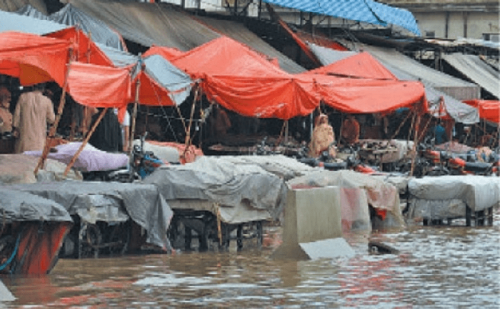PAKISTAN is no stranger to urban flooding. All Pakistani cities — from Karachi to Lahore to Peshawar — have faced urban flooding during the monsoons for several decades.
However, in recent years, climate change has brought with it more intense and uncertain weather patterns, exposing urban populations to increased risk of loss of life, livelihood, and property, with instances of urban flooding on the rise.
If the massive deluge that drowned most parts of Karachi for several days in August 2020 wasn’t proof enough, the unfortunate loss of at least 26 lives in Lahore, and elsewhere in Punjab, in the last two days of downpour clearly shows that the scale of the threat posed to city dwellers by pluvial flooding — which occurs when the surface water accumulating from intense rainfall saturates urban drainage systems, and excess water can’t be absorbed — is increasing with time.
The problem is compounded by unplanned urbanisation and unregulated development, growing city sprawls, inadequate storm water drainage systems, sewerage lines clogged by solid waste and encroachments, alteration of natural drainage routes owing to haphazard construction, and poor urban governance. While the natural factors are to blame for intense and uncertain rainfall, the disaster is purely manmade.
With the number of people living in the urban areas increasing rapidly — owing to a high population growth rate and migration from the rural areas — and cities projected to house half the Pakistani population by 2050, the rising incidence of urban flooding presents a major challenge to planners.
The solution demands a paradigm shift in existing urban development policies that must look much beyond building roads, bridges and signal-free corridors for car owners and encouraging city sprawls for the wealthy.
Each city requires a master plan to augment the water-carrying capacity of its sewerage and storm water drainage systems in view of the increasing intensity of rainfall, to protect green spaces, drain excess rainwater, discourage urban sprawl, improve solid waste disposal and management, enhance the capacity of civic agencies, and so on.
Most importantly, the country’s collapsing cities need vibrant and financially and administratively autonomous elected local governments for better urban management and planning.
Without tackling the myriad problems our cities are facing in a holistic manner and improving urban governance, the piecemeal measures are unlikely to eliminate menace of pluvial flooding anytime soon.
Published in Dawn, July 7th, 2023















































Dear visitor, the comments section is undergoing an overhaul and will return soon.